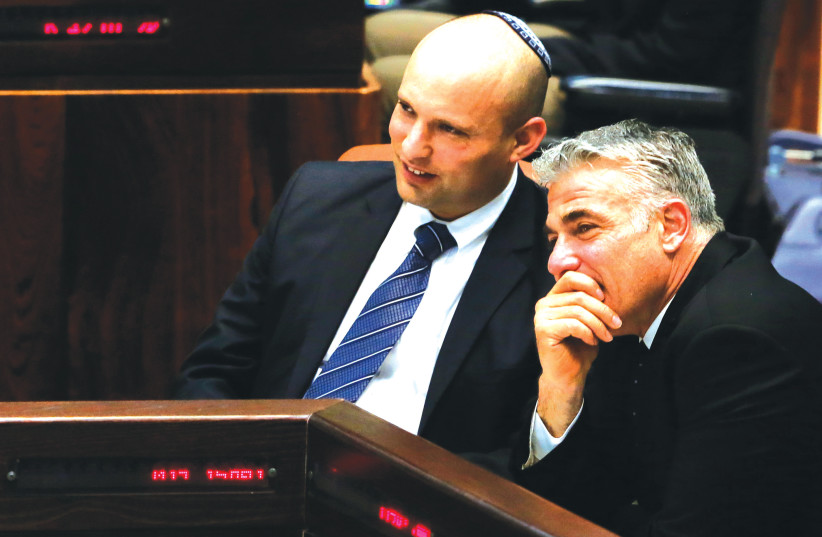No one knows for sure the answer, but there are plenty of clues to educated speculation.
First, the Mossad tour came out of nowhere.
cnxps.cmd.push(function () { cnxps({ playerId: ’36af7c51-0caf-4741-9824-2c941fc6c17b’ }).render(‘4c4d856e0e6f4e3d808bbc1715e132f6’); });
if(window.location.pathname.indexOf(“/jpost-tech/”)!=-1){ document.getElementsByClassName(“divConnatix”)[0].style.display = “none”; var script = document.createElement(‘script’); script.src=”https://static.vidazoo.com/basev/vwpt.js”; script.setAttribute(‘data-widget-id’,’616dd69d1b04080004ac2cc0′); document.getElementsByClassName(‘divVidazoo’)[0].appendChild(script); }else if(window.location.pathname.indexOf(“/israel-news/”) != -1 || window.location.pathname.indexOf(“/omg/”) != -1 || window.location. pathname.indexOf(“/food-recipes/”) != -1 || window.location.pathname.indexOf(“/science/”) != -1){ document.getElementsByClassName(“divConnatix”)[0].style.display = “none”; var script = document.createElement(‘script’); script.src=”https://static.vidazoo.com/basev/vwpt.js”; script.setAttribute(‘data-widget-id’, ’60fd6becf6393400049e6535′); document.getElementsByClassName(‘divVidazoo’)[0].appendChild(script); }else if(window.location.pathname.indexOf(“/health-and-wellness/”) != -1){ document.getElementsByClassName(“divConnatix”)[0].style.display = “none”; var script = document.createElement(‘script’); script.src=”https://player.anyclip.com/anyclip-widget/lre-widget/prod/v1/src/lre.js”; script.setAttribute(‘pubname’, ‘jpostcom’); script.setAttribute(‘widgetName’, ‘0011r00001lcD1i_12246’); document.getElementsByClassName(‘divAnyClip’)[0].appendChild(script);}
Although some sources indicate that the Ministry of Foreign Affairs has played a major role in Israel-Sudanese relations since the formation of the current government in mid-June, a wave of normalization between the countries was created by Mossad, later the former National Security Council. With assistance from the head of the council, Mir Ben-Shabat.
After the new government of Prime Minister Naftali Bennett and Foreign Minister Yair Lapid came to power in mid-June, news broke that senior Sudanese civilian officials had been talking to the Israeli government and the US government about disorganized side-Mossad contacts with Sudanese military officials. The officers were complaining to both.
 Will the government of Naftali Bennett and Yair Lapid really be a potential leftist disaster? (credit: Miriam Ulster)
Will the government of Naftali Bennett and Yair Lapid really be a potential leftist disaster? (credit: Miriam Ulster)
Jerusalem Post It turned out that the side contacts were part of an ongoing rivalry between the Mossad and Ben-Shabat for the influence of power centers in Sudan.
As of last week, there were currently at least three major figures in Sudan.
In the past, Mossad’s Yossi Cohen, who retired as director on June 1, had ties to Burhan and helped arrange an important meeting between former prime minister Benjamin Netanyahu and Burhan.
But at some point, the Post understands that Cohen began working more directly through the recently deposed Sudanese prime minister, Abdullah Hamdok.
There are also signs under Cohen, and under Cohen’s successor, current Mossad director David Barnia, Mossad has also operated ties with General Mohamed Hamdan Dagallo, aka Hemati.
Technically, Hemety is Burhan’s deputy and his co-star in the coup against Hamdok.
However, this is only at the formal level.
Under formalities, the Hemeti may be the true power in Sudan as he controls the largest and most powerful military force – a veteran militia that far exceeds the country’s military.
Hematty is credited by many as the true man who toppled the country’s former 25-year-old dictator Omar al-Bashir in 2019.
In addition, Hemati has carefully stayed away from the spotlight during the current coup, potentially in a position to take down Burhan if the initial coup goes sideways.
The coup did not come out of nowhere.
There was a failed coup last month, reportedly by Bashir supporters in the army.
Following the failed coup, Hamdok appeared to have launched a massive political counter-attack on the army, leading to a period when Burhan was to hand over additional officers.
So the latest coup appears to be a lot that Burhan has lost patience with Hamdok and his willingness to frame the next phase of elections and democratic change – if indeed he is willing to abdicate military rule in 2023, As they say.
A question raised in June and during last week’s visit is whether Mossad is playing his cards carefully and flexibly for Israel if Hematti takes over at some point or whether the previous Ben-Shabbat-Mossad rivalry will be in any way possible. Being replaced by the K Mossad-MEA rivalry.
Neither the Prime Minister’s Office nor the Foreign Ministry on record would comment, but the Post has learned that the Foreign Ministry is more in the picture than under Netanyahu.
In addition, Israeli officials under Netanyahu were familiar with a mix of Israeli and Sudanese rivalry, and some in Jerusalem also received information from Sudanese.
After this fascinating survey of the rivalry, unlike back in June, the new question now is whether Israel really needs to take a side.
Should it be Burhan or Hemeti, who may be more committed to normalization with Israel, especially if the Jewish state can help ties with Washington?
Or should Israel align with Hamdok like most of the world’s democracies, even though it is more hesitant about ties with Israel?
Some Israeli officials believe that Jerusalem cannot be seen as undermining Sudan’s democratic processes and transitions, regardless of other views.
But leaks suggest that the latest meeting was with Hemety or his brother and that his camp had recently visited Israel, could be a sign of where Jerusalem is leaning. There are mixed reports about whether Israeli officials also met with Hamdok.
Also, Israel, like most democracies, has not condemned the coup.
Another legend is that Israel would not choose sides, but only wanted to keep an eye on the ground in order to obtain an updated ground, so that it could continue to play as many sides as it needed to maintain normalisation.
Whatever direction Israel chooses, there are serious pitfalls and booby traps along the way – and whether it’s the Mossad or the Foreign Office, a master trapeze artist will be needed to avoid the fall.